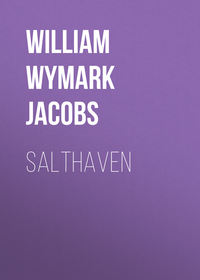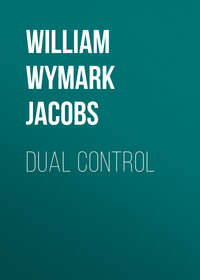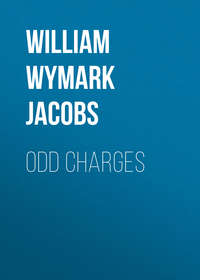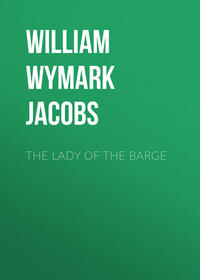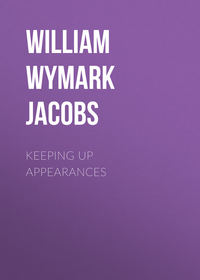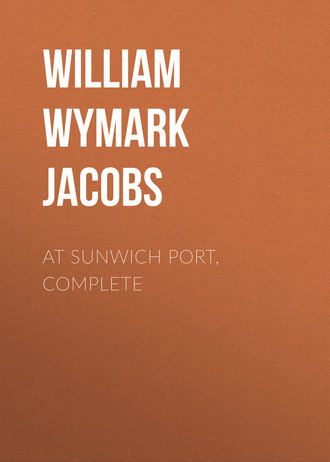 полная версия
полная версияAt Sunwich Port, Complete
Although by dint of casual and cautious inquiries Mr. Hardy found that his partner’s information was correct, he was by no means guilty of any feelings of gratitude towards him; and he only glared scornfully when that excellent but frivolous man mounted a chair on Friday afternoon, and putting the clock on a couple of hours or so, urged him to be in time.
The evening, however, found him starting slowly in the direction of Fullalove Alley. His father had gone to sea again, and the house was very dull; moreover, he felt a mild curiosity to see the changes wrought by time in Mr. Wilks. He walked along by the sea, and as the church clock struck the three-quarters turned into the alley and looked eagerly round for the old steward.
The labours of the day were over, and the inhabitants were for the most part out of doors taking the air. Shirt-sleeved householders, leaning against their door-posts smoking, exchanged ideas across the narrow space paved with cobble-stones which separated their small and ancient houses, while the matrons, more gregariously inclined, bunched in little groups and discussed subjects which in higher circles would have inundated the land with libel actions. Up and down the alley a tiny boy all ready for bed, with the exception of his nightgown, mechanically avoided friendly palms as he sought anxiously for his mother.
The object of Mr. Hardy’s search sat at the door of his front room, which opened on to the alley, smoking an evening pipe, and noting with an interested eye the doings of his neighbours. He was just preparing to draw himself up in his chair as the intruder passed, when to his utter astonishment that gentleman stopped in front of him, and taking possession of his hand shook it fervently.
“How do you do?” he said, smiling.
Mr. Wilks eyed him stupidly and, releasing his hand, coyly placed it in his trouser-pocket and breathed hard.
“I meant to come before,” said Hardy, “but I’ve been so busy. How are you?”
Mr. Wilks, still dazed, muttered that he was very well. Then he sat bolt upright in his chair and eyed his visitor suspiciously.
“I’ve been longing for a chat with you about old times,” said Hardy; “of all my old friends you seem to have changed the least. You don’t look a day older.”
“I’m getting on,” said Mr. Wilks, trying to speak coldly, but observing with some gratification the effect produced upon his neighbours by the appearance of this well-dressed acquaintance.
“I wanted to ask your advice,” said the unscrupulous Hardy, speaking in low tones. “I daresay you know I’ve just gone into partnership in Sunwich, and I’m told there’s no man knows more about the business and the ins and outs of this town than you do.”
Mr. Wilks thawed despite himself. His face glistened and his huge mouth broke into tremulous smiles. For a moment he hesitated, and then noticing that a little group near them had suspended their conversation to listen to his he drew his chair back and, in a kind voice, invited the searcher after wisdom to step inside.
Hardy thanked him, and, following him in, took a chair behind the door, and with an air of youthful deference bent his ear to catch the pearls which fell from the lips of his host. Since he was a babe on his mother’s knee sixty years before Mr. Wilks had never had such an attentive and admiring listener. Hardy sat as though glued to his chair, one eye on Mr. Wilks and the other on the clock, and it was not until that ancient timepiece struck the hour that the ex-steward suddenly realized the awkward state of affairs.
“Any more ‘elp I can give you I shall always be pleased to,” he said, looking at the clock.
Hardy thanked him at great length, wondering, as he spoke, whether Miss Nugent was of punctual habits. He leaned back in his chair and, folding his arms, gazed thoughtfully at the perturbed Mr. Wilks.
“You must come round and smoke a pipe with me sometimes,” he said, casually.
Mr. Wilks flushed with gratified pride. He had a vision of himself walking up to the front door of the Hardys, smoking a pipe in a well-appointed room, and telling an incredulous and envious Fullalove Alley about it afterwards.
“I shall be very pleased, sir,” he said, impressively.
“Come round on Tuesday,” said his visitor. “I shall be at home then.”
Mr. Wilks thanked him and, spurred on to hospitality, murmured something about a glass of ale, and retired to the back to draw it. He came back with a jug and a couple of glasses, and draining his own at a draught, hoped that the example would not be lost upon his visitor. That astute person, however, after a modest draught, sat still, anchored to the half-empty glass.
“I’m expecting somebody tonight,” said the ex-steward, at last.
“No doubt you have a lot of visitors,” said the other, admiringly.
Mr. Wilks did not deny it. He eyed his guest’s glass and fidgeted.
“Miss Nugent is coming,” he said.
Instead of any signs of disorder and preparations for rapid flight, Mr. Wilks saw that the other was quite composed. He began to entertain a poor idea of Mr. Hardy’s memory.
“She generally comes for a little quiet chat,” he said.
“Indeed!”
“Just between the two of us,” said the other.
His visitor said “Indeed,” and, as though some chord of memory had been touched, sat gazing dreamily at Mr. Wilks’s horticultural collection in the window. Then he changed colour a little as a smart hat and a pretty face crossed the tiny panes. Mr. Wilks changed colour too, and in an awkward fashion rose to receive Miss Nugent.
“Late as usual, Sam,” said the girl, sinking into a chair. Then she caught sight of Hardy, who was standing by the door.
“It’s a long time since you and I met, Miss Nugent,” he said, bowing.
“Mr. Hardy?” said the girl, doubtfully.
“Yes, miss,” interposed Mr. Wilks, anxious to explain his position. “He called in to see me; quite a surprise to me it was. I ‘ardly knowed him.”
“The last time we three met,” said Hardy, who to his host’s discomfort had resumed his chair, “Wilks was thrashing me and you were urging him on.”
Kate Nugent eyed him carefully. It was preposterous that this young man should take advantage of a boy and girl acquaintance of eleven years before—and such an acquaintance!—in this manner. Her eyes expressed a little surprise, not unmixed with hauteur, but Hardy was too pleased to have them turned in his direction at all to quarrel with their expression.
“You were a bit of a trial in them days,” said Mr. Wilks, shaking his head. “If I live to be ninety I shall never forget seeing Miss Kate capsized the way she was. The way she–”
“How is your cold?” inquired Miss Nugent, hastily.
“Better, miss, thankee,” said Mr. Wilks.
“Miss Nugent has forgotten and forgiven all that long ago,” said Hardy.
“Quite,” assented the girl, coldly; “one cannot remember all the boys and girls one knew as a child.”
“Certainly not,” said Hardy. “I find that many have slipped from my own memory, but I have a most vivid recollection of you.”
Miss Nugent looked at him again, and an idea, strange and incredible, dawned slowly upon her. Childish impressions are lasting, and Jem Hardy had remained in her mind as a sort of youthful ogre. He sat before her now a frank, determined-looking young Englishman, in whose honest eyes admiration of herself could not be concealed. Indignation and surprise struggled for supremacy.
“It’s odd,” remarked Mr. Wilks, who had a happy knack at times of saying the wrong thing, “it’s odd you should ‘ave ‘appened to come just at the same time as Miss Kate did.”
“It’s my good fortune,” said Hardy, with a slight bow. Then he cocked a malignant eye at the innocent Mr. Wilks, and wondered at what age men discarded the useless habit of blushing. Opposite him sat Miss Nugent, calmly observant, the slightest suggestion of disdain in her expression. Framed in the queer, high-backed old chair which had belonged to Mr. Wilks’s grandfather, she made a picture at which Jem Hardy continued to gaze with respectful ardour. A hopeless sense of self-depreciation possessed him, but the idea that Murchison should aspire to so much goodness and beauty made him almost despair of his sex. His reverie was broken by the voice of Mr. Wilks.
“A quarter to eight?” said that gentleman in-credulously; “it can’t be.”
“I thought it was later than that,” said Hardy, simply.
Mr. Wilks gasped, and with a faint shake of his head at the floor abandoned the thankless task of giving hints to a young man who was too obtuse to see them; and it was not until some time later that Mr. Hardy, sorely against his inclinations, gave his host a hearty handshake and, with a respectful bow to Miss Nugent, took his departure.
“Fine young man he’s growed,” said Mr. Wilks, deferentially, turning to his remaining visitor; “greatly improved, I think.”
Miss Nugent looked him over critically before replying. “He seems to have taken a great fancy to you,” she remarked.
Mr. Wilks smiled a satisfied smile. “He came to ask my advice about business,” he said, softly. “He’s ‘eard two or three speak o’ me as knowing a thing or two, and being young, and just starting, ‘e came to talk it over with me. I never see a young man so pleased and ready to take advice as wot he is.”
“He is coming again for more, I suppose?” said Miss Nugent, carelessly.
Mr. Wilks acquiesced. “And he asked me to go over to his ‘ouse to smoke a pipe with ‘im on Tuesday,” he added, in the casual manner in which men allude to their aristocratic connections. “He’s a bit lonely, all by himself.”
Miss Nugent said, “Indeed,” and then, lapsing into silence, gave little occasional side-glances at Mr. Wilks, as though in search of any hidden charms about him which might hitherto have escaped her.
At the same time Mr. James Hardy, walking slowly home by the edge of the sea, pondered on further ways and means of ensnaring the affection of the ex-steward.
CHAPTER VII
The anticipations of Mr. Wilks were more than realized on the following Tuesday. From the time a trim maid showed him into the smoking-room until late at night, when he left, a feted and honoured guest, with one of his host’s best cigars between his teeth, nothing that could yield him any comfort was left undone. In the easiest of easy chairs he sat in the garden beneath the leafy branches of apple trees, and undiluted wisdom and advice flowed from his lips in a stream as he beamed delightedly upon his entertainer.
Their talk was mainly of Sunwich and Sunwich people, and it was an easy step from these to Equator Lodge. On that subject most people would have found the ex-steward somewhat garrulous, but Jem Hardy listened with great content, and even brought him back to it when he showed signs of wandering. Altogether Mr. Wilks spent one of the pleasantest evenings of his life, and, returning home in a slight state of mental exhilaration, severely exercised the tongues of Fullalove Alley by a bearing considered incompatible with his station.
Jem Hardy paid a return call on the following Friday, and had no cause to complain of any lack of warmth in his reception. The ex-steward was delighted to see him, and after showing him various curios picked up during his voyages, took him to the small yard in the rear festooned with scarlet-runner beans, and gave him a chair in full view of the neighbours.
“I’m the only visitor tonight?” said Hardy, after an hour’s patient listening and waiting.
Mr. Wilks nodded casually. “Miss Kate came last night,” he said. “Friday is her night, but she came yesterday instead.”
Mr. Hardy said, “Oh, indeed,” and fell straight-way into a dismal reverie from which the most spirited efforts of his host only partially aroused him.
Without giving way to undue egotism it was pretty clear that Miss Nugent had changed her plans on his account, and a long vista of pleasant Friday evenings suddenly vanished. He, too, resolved to vary his visits, and, starting with a basis of two a week, sat trying to solve the mathematical chances of selecting the same as Kate Nugent; calculations which were not facilitated by a long-winded account from Mr. Wilks of certain interesting amours of his youthful prime.
Before he saw Kate Nugent again, however, another old acquaintance turned up safe and sound in Sunwich. Captain Nugent walking into the town saw him first: a tall, well-knit young man in shabby clothing, whose bearing even in the distance was oddly familiar. As he came closer the captain’s misgivings were confirmed, and in the sunburnt fellow in tattered clothes who advanced upon him with outstretched hand he reluctantly recognized his son.
“What have you come home for?” he inquired, ignoring the hand and eyeing him from head to foot.
“Change,” said Jack Nugent, laconically, as the smile left his face.
The captain shrugged his shoulders and stood silent. His son looked first up the road and then down.
“All well at home?” he inquired.
“Yes.”
Jack Nugent looked up the road again.
“Not much change in the town,” he said, at length.
“No,” said his father.
“Well, I’m glad to have seen you,” said his son. “Good-bye.”
“Good-bye,” said the captain.
His son nodded and, turning on his heel, walked back towards the town. Despite his forlorn appearance his step was jaunty and he carried his head high. The captain watched him until he was hidden by a bend in the road, and then, ashamed of himself for displaying so much emotion, turned his own steps in the direction of home.
“Well, he didn’t whine,” he said, slowly. “He’s got a bit of pride left.”
Meantime the prodigal had reached the town again, and stood ruefully considering his position.
He looked up the street, and then, the well-known shop of Mr. Kybird catching his eye, walked over and inspected the contents of the window. Sheath-knives, belts, tobacco-boxes, and watches were displayed alluringly behind the glass, sheltered from the sun by a row of cheap clothing dangling from short poles over the shop front. All the goods were marked in plain figures in reduced circumstances, Mr. Kybird giving a soaring imagination play in the first marking, and a good business faculty in the second.
At these valuables Jack Nugent, with a view of obtaining some idea of prices, gazed for some time. Then passing between two suits of oilskins which stood as sentinels in the doorway, he entered the shop and smiled affably at Miss Kybird, who was in charge. At his entrance she put down a piece of fancy-work, which Mr. Kybird called his sock, and with a casual glance at his clothes regarded him with a prejudiced eye.
“Beautiful day,” said the customer; “makes one feel quite young again.”
“What do you want?” inquired Miss Kybird.
Mr. Nugent turned to a broken cane-chair which stood by the counter, and, after applying severe tests, regardless of the lady’s feelings, sat down upon it and gave a sigh of relief.
“I’ve walked from London,” he said, in explanation. “I could sit here for hours.”
“Look here–” began the indignant Miss Kybird.
“Only people would be sure to couple our names together,” continued Mr. Nugent, mournfully.
“When a handsome young man and a good-looking girl–”
“Do you want to buy anything or not?” demanded Miss Kybird, with an impatient toss of her head.
“No,” said Jack, “I want to sell.”
“You’ve come to the wrong shop, then,” said Miss Kybird; “the warehouse is full of rubbish now.”
The other turned in his chair and looked hard at the window. “So it is,” he assented. “It’s a good job I’ve brought you something decent to put there.”
He felt in his pockets and, producing a silver-mounted briar-pipe, a battered watch, a knife, and a few other small articles, deposited them with reverent care upon the counter.
“No use to us,” declared Miss Kybird, anxious to hit back; “we burn coal here.”
“These’ll burn better than the coal you buy,” said the unmoved customer.
“Well, we don’t want them,” retorted Miss Kybird, raising her voice, “and I don’t want any of your impudence. Get up out of our chair.”
Her heightened tones penetrated to the small and untidy room behind the shop. The door opened, and Mr. Kybird in his shirt-sleeves appeared at the opening.
“Wot’s the row?” he demanded, his little black eyes glancing from one to the other.
“Only a lovers’ quarrel,” replied Jack. “You go away; we don’t want you.”
“Look ‘ere, we don’t want none o’ your nonsense,” said the shopkeeper, sharply; “and, wot’s more, we won’t ‘ave it. Who put that rubbish on my counter?”
He bustled forward, and taking the articles in his hands examined them closely.
“Three shillings for the lot—cash,” he remarked. “Done,” said the other.
“Did I say three?” inquired Mr. Kybird, startled at this ready acceptance.
“Five you said,” replied Mr. Nugent, “but I’ll take three, if you throw in a smile.”
Mr. Kybird, much against his inclinations, threw in a faint grin, and opening a drawer produced three shillings and flung them separately on the counter. Miss Kybird thawed somewhat, and glancing from the customer’s clothes to his face saw that he had a pleasant eye and a good moustache, together with a general air of recklessness much appreciated by the sex.
“Don’t spend it on drink,” she remarked, not unkindly.
“I won’t,” said the other, solemnly; “I’m going to buy house property with it.”
“Why, darn my eyes,” said Mr. Kybird, who had been regarding him closely; “darn my old eyes, if it ain’t young Nugent. Well, well!”
“That’s me,” said young Nugent, cheerfully; “I should have known you anywhere, Kybird: same old face, same old voice, same old shirt-sleeves.”
“‘Ere, come now,” objected the shopkeeper, shortening his arm and squinting along it.
“I should have known you anywhere,” continued the other, mournfully; “and here I’ve thrown up a splendid berth and come all the way from Australia just for one glimpse of Miss Kybird, and she doesn’t know me. When I die, Kybird, you will find the word ‘Calais’ engraven upon my heart.”
Mr. Kybird said, “Oh, indeed.” His daughter tossed her head and bade Mr. Nugent take his nonsense to people who might like it.
“Last time I see you,” said Mr. Kybird, pursing up his lips and gazing at the counter in an effort of memory; “last time I see you was one fifth o’ November when you an’ another bright young party was going about in two suits o’ oilskins wot I’d been ‘unting for ‘igh and low all day long.”
Jack Nugent sighed. “They were happy times, Kybird.”
“Might ha’ been for you,” retorted the other, his temper rising a little at the remembrance of his wrongs.
“Have you come home for good? inquired Miss Kybird, curiously. Have you seen your father? He passed here a little while ago.”
“I saw him,” said Jack, with a brevity which was not lost upon the astute Mr. Kybird. “I may stay in Sunwich, and I may not—it all depends.”
“You’re not going ‘ome?” said Mr. Kybird.
“No.”
The shopkeeper stood considering. He had a small room to let at the top of his house, and he stood divided between the fear of not getting his rent and the joy to a man fond of simple pleasures, to be obtained by dunning the arrogant Captain Nugent for his son’s debts. Before he could arrive at a decision his meditations were interrupted by the entrance of a stout, sandy-haired lady from the back parlour, who, having conquered his scruples against matrimony some thirty years before, had kept a particularly wide-awake eye upon him ever since.
“Your tea’s a-gettin’ cold,” she remarked, severely.
Her husband received the news with calmness. He was by no means an enthusiast where that liquid was concerned, the admiration evoked by its non-inebriating qualities having been always something in the nature of a mystery to him.
“I’m coming,” he retorted; “I’m just ‘aving a word with Mr. Nugent ‘ere.”
“Well, I never did,” said the stout lady, coming farther into the shop and regarding the visitor. “I shouldn’t ‘ave knowed ‘im. If you’d asked me who ‘e was I couldn’t ha’ told you—I shouldn’t ‘ave knowed ‘im from Adam.”
Jack shook his head. “It’s hard to be forgotten like this,” he said, sadly. “Even Miss Kybird had forgotten me, after all that had passed between us.”
“Eh?” said Mr. Kybird.
“Oh, don’t take any notice of him,” said his daughter. “I’d like to see myself.”
Mr. Kybird paid no heed. He was still thinking of the son of Captain Nugent being indebted to him for lodging, and the more he thought of the idea the better he liked it.
“Well, now you’re ‘ere,” he said, with a great assumption of cordiality, “why not come in and ‘ave a cup o’ tea?”
The other hesitated a moment and then, with a light laugh, accepted the offer. He followed them into the small and untidy back parlour, and being requested by his hostess to squeeze in next to ‘Melia at the small round table, complied so literally with the order that that young lady complained bitterly of his encroachments.
“And where do you think of sleeping tonight?” inquired Mr. Kybird after his daughter had, to use her own expressive phrase, shown the guest “his place.”
Mr. Nugent shook his head. “I shall get a lodging somewhere,” he said, airily.
“There’s a room upstairs as you might ‘ave if you liked,” said Mr. Kybird, slowly. “It’s been let to a very respectable, clean young man for half a crown a week. Really it ought to be three shillings, but if you like to ‘ave it at the old price, you can.”
“Done with you,” said the other.
“No doubt you’ll soon get something to do,” continued Mr. Kybird, more in answer to his wife’s inquiring glances than anything else. “Half a crown every Saturday and the room’s yours.”
Mr. Nugent thanked him, and after making a tea which caused Mr. Kybird to congratulate himself upon the fact that he hadn’t offered to board him, sat regaling Mrs. Kybird and daughter with a recital of his adventures in Australia, receiving in return a full and true account of Sunwich and its people up to date.
“There’s no pride about ‘im, that’s what I like,” said Mrs. Kybird to her lord and master as they sat alone after closing time over a glass of gin and water. “He’s a nice young feller, but bisness is bisness, and s’pose you don’t get your rent?”
“I shall get it sooner or later,” said Mr. Kybird. “That stuck-up father of ‘is ‘ll be in a fine way at ‘im living here. That’s wot I’m thinking of.”
“I don’t see why,” said Mrs. Kybird, bridling. “Who’s Captain Nugent, I should like to know? We’re as good as what ‘e is, if not better. And as for the gell, if she’d got ‘alf Amelia’s looks she’d do.”
“‘Melia’s a fine-looking gal,” assented Mr. Kybird. “I wonder–”
He laid his pipe down on the table and stared at the mantelpiece. “He seems very struck with ‘er,” he concluded. “I see that directly.”
“Not afore I did,” said his wife, sharply.
“See it afore you come into the shop,” said Mr. Kybird, triumphantly. “It ‘ud be a strange thing to marry into that family, Emma.”
“She’s keeping company with young Teddy Silk,” his wife reminded him, coldly; “and if she wasn’t she could do better than a young man without a penny in ‘is pocket. Pride’s a fine thing, Dan’l, but you can’t live on it.”
“I know what I’m talking about,” said Mr. Kybird, impatiently. “I know she’s keeping company with Teddy as well as wot you do. Still, as far as money goes, young Nugent ‘ll be all right.”
“‘Ow?” inquired his wife.
Mr. Kybird hesitated and took a sip of his gin and water. Then he regarded the wife of his bosom with a calculating glance which at once excited that lady’s easily kindled wrath.
“You know I never tell secrets,” she cried.
“Not often,” corrected Mr. Kybird, “but then I don’t often tell you any. Wot would you say to young Nugent coming into five ‘undred pounds ‘is mother left ‘im when he’s twenty-five? He don’t know it, but I do.”
“Five ‘undred,” repeated his wife, “sure?”
“No,” said the other, “I’m not sure, but I know. I ‘ad it from young Roberts when ‘e was at Stone and Dartnell’s. Five ‘undred pounds! I shall get my money all right some time, and, if ‘e wants a little bit to go on with, ‘e can have it. He’s honest enough; I can see that by his manner.”
Upstairs in the tiny room under the tiles Mr. Jack Nugent, in blissful ignorance of his landlord’s generous sentiments towards him, slept the sound, dreamless sleep of the man free from monetary cares. In the sanctity of her chamber Miss Kybird, gazing approvingly at the reflection of her yellow hair and fine eyes in the little cracked looking-glass, was already comparing him very favourably with the somewhat pessimistic Mr. Silk.



